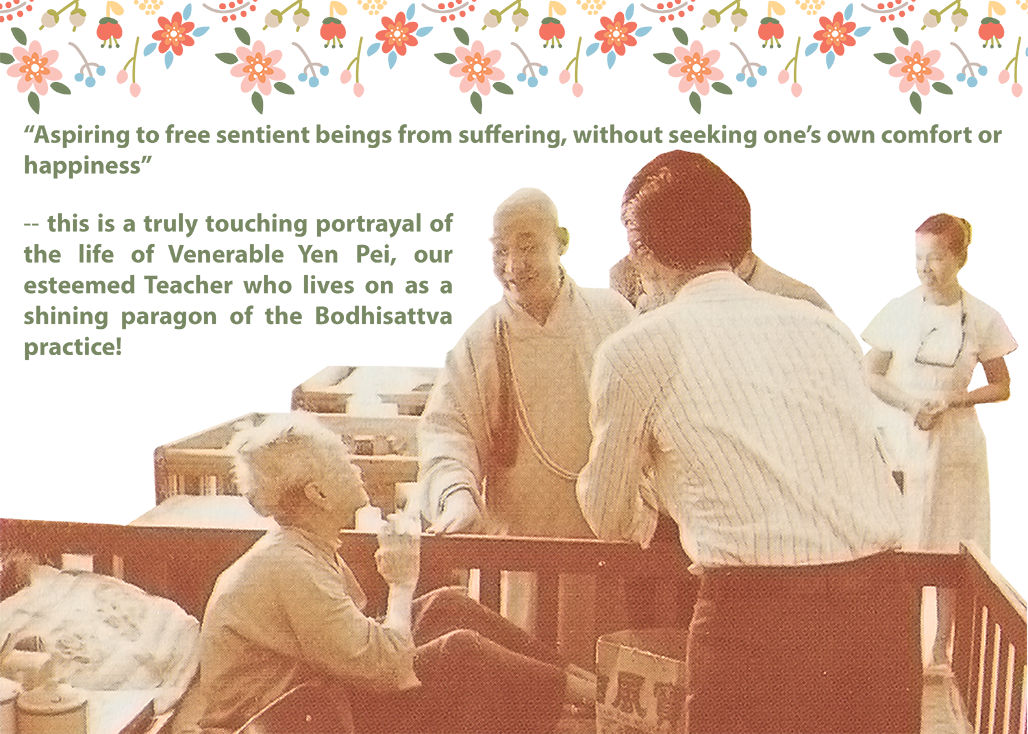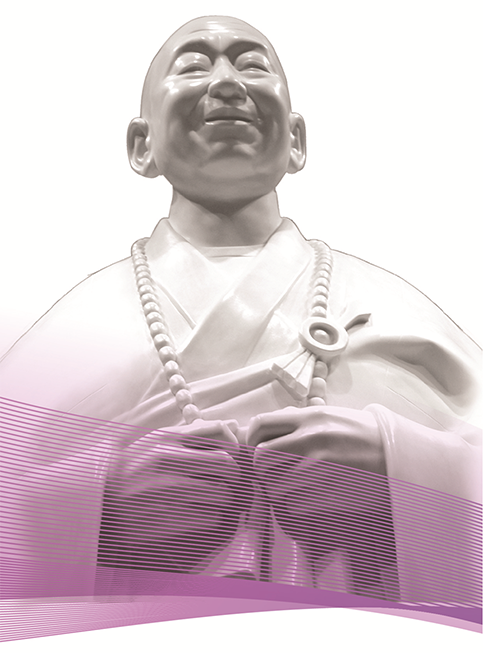VENERABLE YEN PEI
- Staunch Practitioner of Humanistic Buddhism
(1917-1996)
Venerable Yen Pei was born on the first day of the twelfth lunar month in 1917, in a Buddhist family in Yangzhou, Jiangsu Province, China. His secular name was Li Baoliang.
In 1928, at the age of 11, he followed his parents to Guan Yin Monastery, to attend his second brother’s ordination ceremony, as well as a seven-day prayer assembly. As an innocent and bright child, he was well-liked by all the Venerables there. He developed a liking for monastic life and was thus reluctant to follow his parents home after the prayer assembly ended. Since then, he had forged an indissoluble bond with Buddhism!
In 1929, at the age of 12, he became a novice monk under the guidance of Venerable Chang Shan at Fu Tian Temple.
In 1935, at the age of 18, he received Higher Ordination at Fu Shou Ch’an Monastery, thus becoming a full-fledged Buddhist monk. One of the senior monks encouraged him to pursue in-depth studies at a Buddhist college, so as to propagate the Dharma (Buddhist teachings) in future. The thought of seeking higher Dharma-learning was constantly on his mind henceforth.
His teacher hoped that he would succeed as the next abbot of Fu Tian Temple. However, he was determined to pursue Buddhist studies and left Fu Tian Temple in quest of Dharma teachings. He first went to Guan Zong Monastery in Zhejiang Province, where he learnt the teachings and meditative practice of Tian Tai school from Venerable Bao Jing.
In 1937, when war broke out, he left Wuxi with Venerable Ci Hang and eventually reached Hong Kong.
In 1940, he made an arduous journey, together with four fellow students, from Hong Kong to Chongqing, in order to study at Han Zang Dharma Institute. In his recollection of this Dharma-quest, he wrote:
.
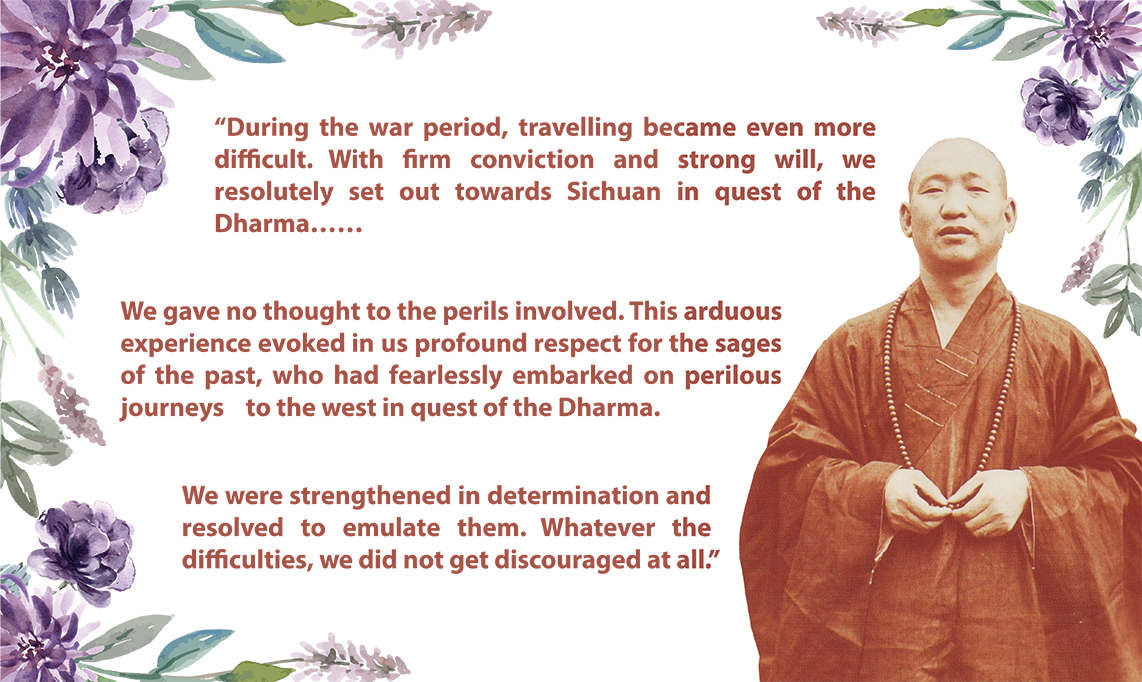
.
Han Zang Dharma Institute, which was established by Master Tai Xu, was the highest institute of Buddhist studies in China during the war period. Master Tai Xu gave special permission for these five young monks to choose the classes that they wished to attend.
Venerable Yen Pei attended Venerable Fa Zun’s lectures on the Great Treatise on Stages of the Path to Enlightenment, Venerable Fa Fang’s lectures on Treasury of Higher Knowledge (Abhidharmakośa-śāstra) and Venerable Yin Shun’s lectures on Āgama Sūtras. Venerable Yin Shun also gave private lessons on Comprehensive Treatise on Mahayana Buddhism (Mahāyāna-saṃparigraha-śāstra) to Venerable Yen Pei and two of his classmates. Under the influence and guidance of Master Tai Xu and Venerable Yin Shun, Venerable Yen Pei began to have a new, deeper understanding of Dharma.
Master Tai Xu had a good opinion of the young Venerable Yen Pei and recommended that he should “learn more from Venerable Yin Shun”. In 1941, at the age of 25, Venerable Yen Pei was assigned by Master Tai Xu to set up and run Fa Wang Buddhist College in Hejiang, Sichuan. He requested Venerable Yin Shun to be the Supreme Advisor of the college. In the ensuing three years, in the course of running the college, he continued to learn Dharma from Venerable Yin Shun at the same time.
During the period from 1944 to 1948, he taught at various Buddhist colleges, including Hua Xi Buddhist College in Shifang, Lian Zong Buddhist College in Chengdu, Han Zang Buddhist College in Wuxi, Shanghai Buddhist College and Da Jue Lecture-Hall in Xiamen.
In 1945, he was assigned by Master Tai Xu to manage Wu Lin Buddhist College in Hangzhou, together with Venerable Miao Qin.
In 1952, at the invitation of Mr. Li Zikuan, he went to Taiwan to take charge of the Taiwan Buddhist Studies Course for three years.
In 1957, Venerable Yin Shun set up a Buddhist College for Women in Xinzhu, Taiwan. Venerable Yen Pei was appointed as the vice-principal, as well as one of the lecturers, of the college.
In 1958, Venerable Yen Pei taught at Ling Yin Buddhist College in Taiwan. He was appointed as principal of Tai Xu Buddhist College in 1967 and principal of Yue Mei Shan Chinese Buddhist College in 1977. In 1984, he was appointed as the advisor, as well as one of the lecturers, of Zhu Xi Monastery. In 1990, he was appointed as the first principal of Yuan Heng Buddhist College.
.
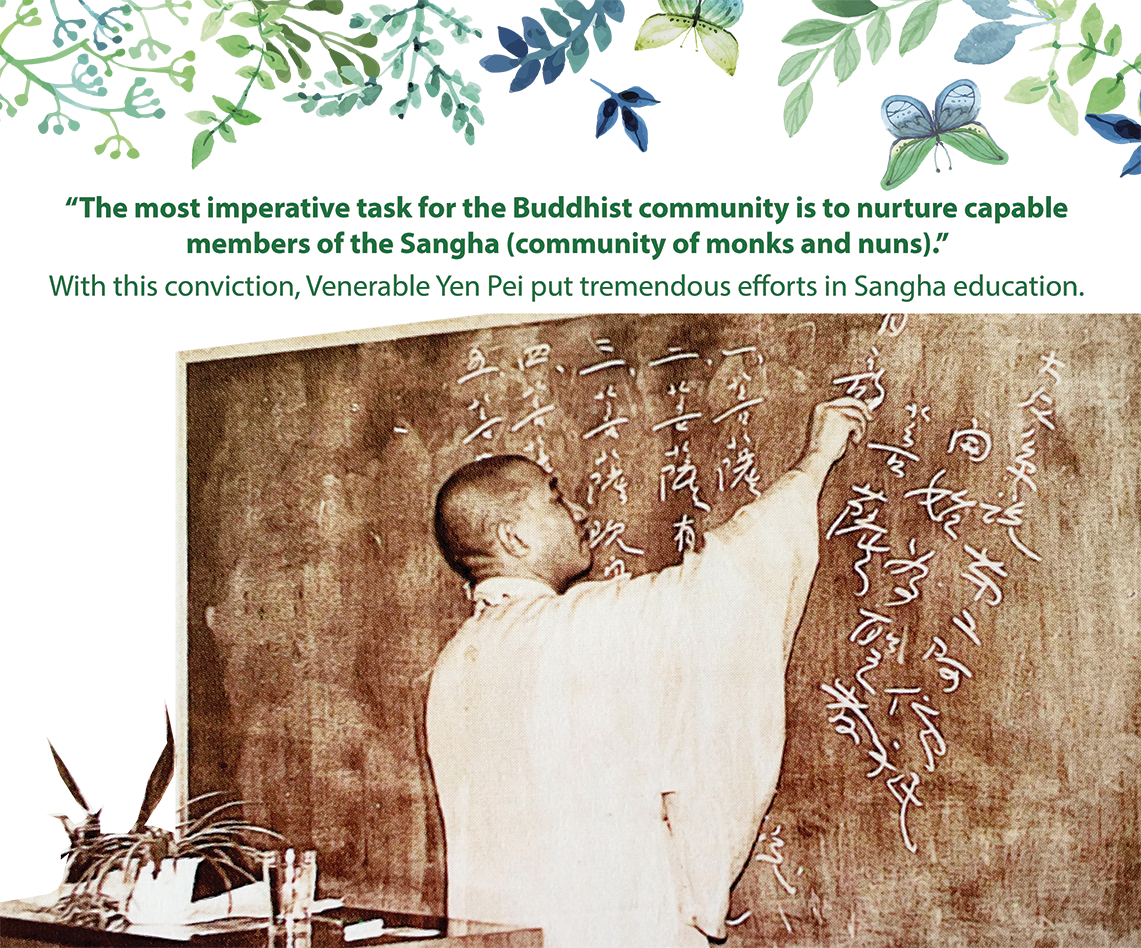
.
He recalled, “Master [Tai Xu] had been most kind and compassionate towards me. It is only by implementing Sangha education based on the Master’s guiding principles and achieving some results that I could repay his deep kindness in a small way.”
He not only taught and encouraged Sangha youths in earnest, but also set an exemplary model for them. In that turbulent period of warfare, he groomed many Sangha members who excelled in both virtue and learning, in both mainland China and Taiwan.
Venerable Yen Pei devoted his life to the cause of Dharma-propagation. Since 1954, apart from lecturing in Buddhist colleges, he also took up abbotship of various monasteries, as well as delivered Dharma-talks for the masses, in order to nourish the wisdom-life of sentient beings. He was invited to expound Dharma in various countries, such as Vietnam, Thailand, Cambodia, the Philippines, Malaysia, Singapore and the United States of America.
In An Ordinary Life, Venerable Yin Shun commented, “He [Yen Pei] is gifted with eloquence and a good voice, so he connects well with people in his Dharma-propagation activities overseas.”
.
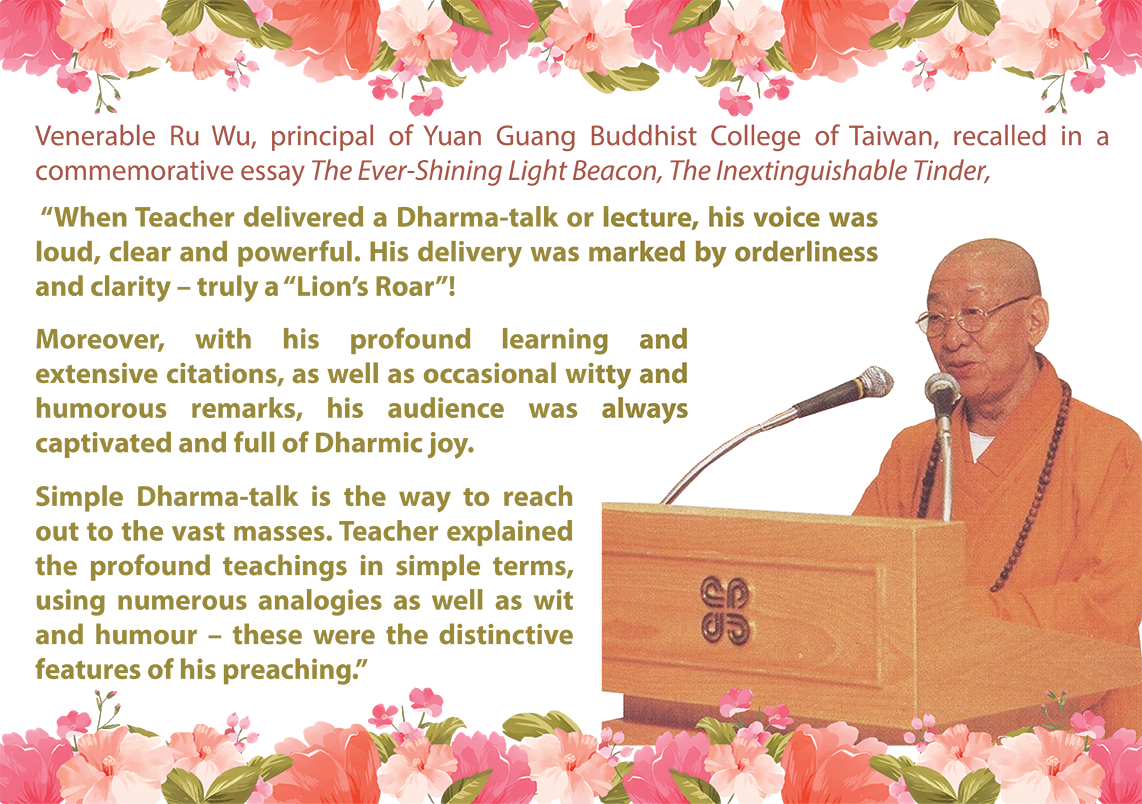
.
In An Ordinary Life, Venerable Yin Shun commented, “He [Yen Pei] is gifted with eloquence and a good voice, so he connects well with people in his Dharma-Venerable Yen Pei was well-versed in the Sutras (Buddha’s discourses), Vinaya (disciplinary rules) and Abhidharma (commentaries). Apart from Sangha education and Dharma-propagation, he was continually engaged in writing. He elucidated the teachings in Buddhist scriptures using modern language and way of thinking, along with detailed analyses, so his exposition is clear and easy to understand.
His essays and Dharma-talk transcripts are compiled in Di Guan Collected Works (34 volumes) and Di Guan Sequel (12 volumes), which comprise over eight million words in total.
He had expository works on Buddhist discourses such as Diamond Sutra, Heart Sutra, Teachings of Vimalakīrti, Discourse on Maitreya’s Great Attainment of Buddhahood, Chapter on Emptiness of Golden Light Sutra, Medicine Buddha Sutra, Chapter on the Universal Doors of Avalokitesvara Bodhisattva, Chapter on the Vows and Practices of Samantabhadra Bodhisattva, The Lion’s Roar of Queen Srimala, Discourse Preached to the Girl Sumati, Discourse on the Eightfold Realisation of Great Beings, Discourse on the Path of Ten Wholesome Actions and Discourse on Explication of the Profound, Underlying Meaning (Saṃdhinirmocana-sūtra).
His expository works on the Buddhist discipline include Lectures on the Bodhisattva Vows based on “Discourse on Brahma’s Net”, as well as Essence of the Monastic Disciplinary Rules Applicable in Daily Life.
He had expository works on Buddhist commentarial works such as Treasury of Higher Knowledge, Treatise on the Wheel of Propositions of Different Schools (Samaya-bhedoparacana cakra), Treatise on Establishment of the Consciousness-Only Theory, Verses Delineating the Eight Consciousnesses, Twenty Verses on the Consciousness-Only Theory, Introduction to the Middle Way, An Essay of Exhortation to Generate the Resolution for Enlightenment, as well as exposition on the verses in Way to Buddhahood.
Other important publications include: The Buddhist View of Dependent Arising, The Consciousness-Only Theory and its Developments, Different Views of Indian Sectarian Buddhism, Karma and Karma-Arisen Rebirth, Buddha of Our Human World, Lectures on “Sixth Patriarch’s Platform Sutra”, Lectures on the “Compassionate Samadhi-Water Repentance”, Explanation of “Ode to the Triple Gem” and Ten Lectures on the Eight Precepts.
.
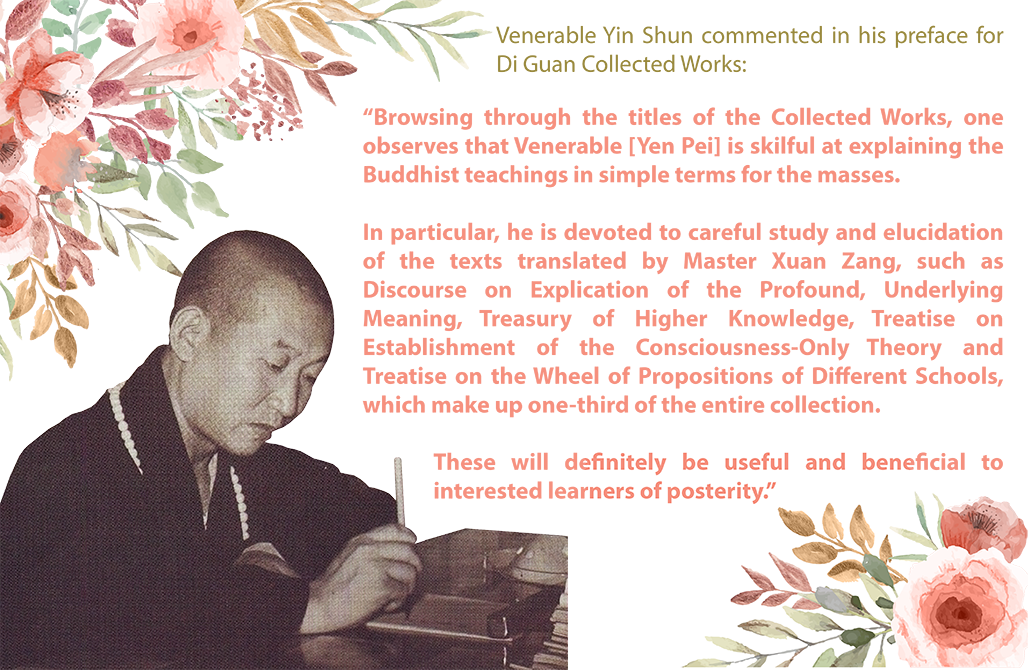
.
These copious writings are the Dharma-relics left by Venerable Yen Pei. They are the light-beacons to guide us in understanding Dharma and illuminate our paths to Enlightenment!
Venerable Yen Pei balanced external Dharma-propagation efforts with inner self-cultivation. Being wholeheartedly devoted to the welfare of sentient beings, he actively promoted Buddhist education, culture and charitable work.
In 1981, Venerable Yen Pei established Fu Hui Auditorium in Singapore and set up Singapore Buddhist Welfare Services to promote the Buddhist spirit of great compassion. He mobilised volunteers to distribute monthly relief funds and food rations to the destitute elderly and less fortunate families. He frequently brought volunteers to visit patients in hospitals, as well as initiated blood-donation and organ-donation drives. He further established numerous welfare divisions to care for the sick, elderly and destitute. These include: Grace Lodge (nursing home), Grace Child Development Centre, Singapore Buddhist Welfare Services-National Kidney Foundation dialysis centre in Hougang, Hearty Stopover (family service centre, now called “Hearty Care Centre”), Green Haven (halfway house), Happy Villa (community home for the elderly) and Bright Vision Hospital.
In recognition of Venerable Yen Pei’s immense contributions to social welfare in Singapore, he was awarded the Public Service Medal (PBM) in 1986 and the Public Service Star (BBM) in 1992.
.
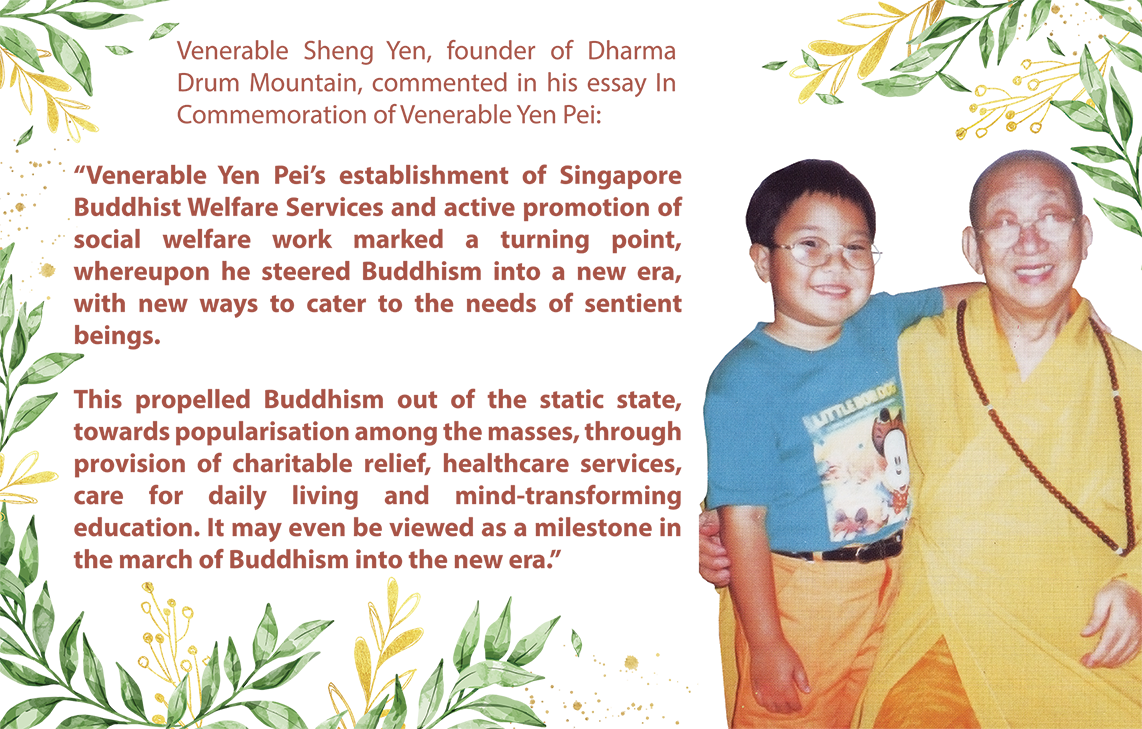
Venerable Yen Pei had all along been deeply concerned about global developments and the suffering in our human world. He spread Buddha’s message of peace earnestly and worked indefatigably for the establishment of a pureland in this human world.
In 1986, he was appointed by the President of the Republic of Singapore as the Buddhist Representative in the Singapore Presidential Council on Religious Harmony.
In 1994, he represented the religious community of Singapore and led a delegation of five religious observers to attend the “World Conference on Religion and Peace” held in Italy.
In October 1996, he was invited to attend the “Asian Conference on Religion and Peace” held in Bangkok, Thailand. He was elected as the Chairman of the Asia Region Relief Committee. At this conference, he sang the song of peace, together with religious teachers and delegates from all over the world…… This was the final trip before he rounded up this life-journey.
On 10 November 1996, Venerable Yen Pei passed on at Fu Hui Auditorium at the age of 80. He had led a life of renunciation for 68 years and been a full-fledged monk for 62 years.
.
